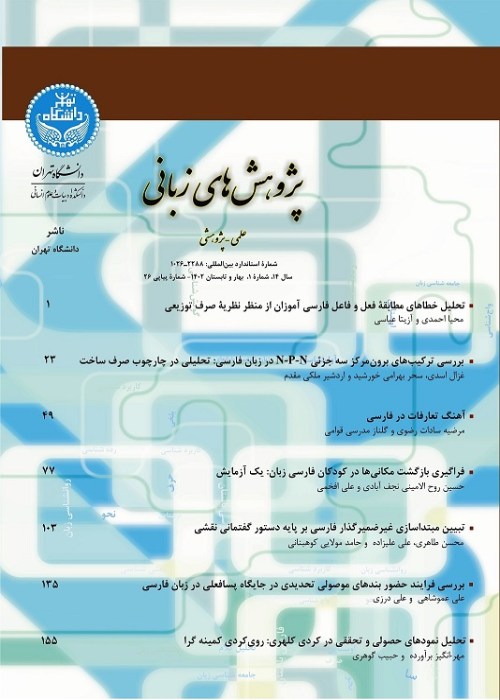The Cognitive Study of the Effect of Cultural Artifacts on the Metaphorical Comprehension of Time Concept in Persian
In different cultures, people use space to make linguistic representations of time. In general, there are two different approaches toward deictic time expressions: a Moving Time Metaphor and a Moving Ego Metaphor. In the Moving Time metaphor, time is conceived as moving forward, while in a Moving Ego Metaphor, a moving observer is conceptualized. The purpose of this research is to explore the effect of cultural artifacts on metaphorical comprehension of time expressions in Persian language. In this regard, following Duffy and Feist (2014), the present study was carried out based on the ambiguous question: Wednesday's Meeting suggested by McGlone and Harding (1998). The first experiment directly explores the relationship between responses to the Wednesday's Meeting question in two calendar and meta-language conditions. The second experiment examines the special cultural relations between space and time and the role of the Persian orthography direction in the time reasoning. In the third experiment, based on circular representations of time, the role of the analog clock in resolving the ambiguity is examined from the Noon's Meeting question. This was done by comparing the responses of the participants with the clockwise clock and counterclockwise clock. To this end, 40 Persian speakers were selected from the students of Sistan and Baluchestan University. Chi-square test (using SPSS software) was used for statistical analysis. The findings of this study show that the viewpoint of individuals about the motion of events in time is not only due to their experience in space movement, but also is rooted in their interactive patterns of cultural artifacts as well. In addition, the results show that in interpreting ambiguous metaphorical time expressions, individuals automatically access spatial representations of time and use them. The participants who encountered with reverse space-time mappings had an interference in their responses, reflected through their time reasoning. Consequently, they provide a more precise form of representations of time than merely symbolic speech. Hence, cultural artifacts play an important role in the cognitive process of embodiment, which not only help to recognize embodiment, but also affect it.
- حق عضویت دریافتی صرف حمایت از نشریات عضو و نگهداری، تکمیل و توسعه مگیران میشود.
- پرداخت حق اشتراک و دانلود مقالات اجازه بازنشر آن در سایر رسانههای چاپی و دیجیتال را به کاربر نمیدهد.



